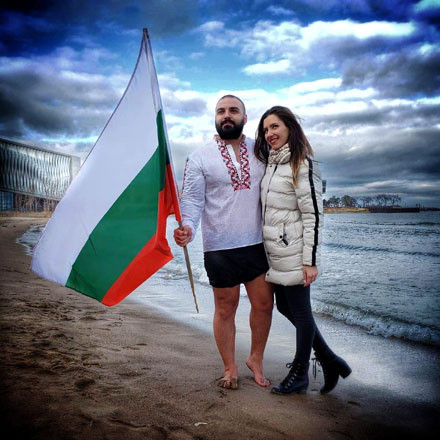Twenty men danced the horo in the icy waters of Lake Michigan waving the Bulgarian flag. Another 300 watched from the shore, oblivious to the cold and the icy wind. A little before that father Gruyu Tsankov from the Saint Sophia church near Chicago held service, blessed those present and threw the cross into the waters. Ivo Kostov from Razgrad was the one to fish it out of the icy waters.
That was how, once again, Bulgarians in Chicago performed the Epiphany ritual.

The idea for this emotional event and its organization belongs to Delcho Stoev and his girlfriend Sonya Petrova.
 Delcho Stoev emigrated to the USA with his parents in 2004, but still carries his homeland in his heart. How did the idea for the Epiphany initiative in Chicago come to him?
Delcho Stoev emigrated to the USA with his parents in 2004, but still carries his homeland in his heart. How did the idea for the Epiphany initiative in Chicago come to him?
"Years ago, as a child in Kardzhali where I grew up, I would dive into the waters of the dam lake on 6 January. So, I wanted to do something like that here, in Chicago, where there is a large Bulgarian community. Until then nobody in America had celebrated Epiphany. I watched the ritual being performed in Bulgaria. Obviously dancing the horo in the water is something new, it didn’t use to be part of the tradition."
Delcho laid the beginnings all by himself in 2015. Last year he brought in a record number of people – around 360. But this year the number of people who dived into the icy water for the cross was the largest. "This time the initiative was joined by Bulgaria’s consul general in Chicago Ivan Anchev, for which I am very grateful", Delcho says.
The organizer of the event was one of the people who dived into the water, but he also played the bagpipe. To be able to do that Delcho took bagpipe lessons for three months with bagpipe player Kiril Ketev.

What does it feel like to wave the Bulgarian flag over Lake Michigan? Delcho Stoev:
"It is an incredible feeling. That is one more reason why I decided to do something different for Bulgarians here – to bring together as many people as I can and keep the tradition alive".
Now Bulgarians in Chicago are getting ready to mark the Bulgarian Surva custom for the second time. The event is organized by two other enthusiasts – Emil Milanov and Nikolay Vassilev from Pernik.


But, as Delcho says, the Bulgarian community is closely-knit, and not only on festive occasions but at all times: “Bulgarians here support and help one another.” Many of them are living with the idea of one day returning to their native country. The life as expats is not always a dream come true, and every choice in life has its price.
"Life for Bulgarians here means a 10-12 hour workday, driving trucks and very little time for the family. This is particularly true of those who drive TIR trucks who spend weeks on the road".
They frequently spend their spare time at Bulgarian cultural centres, cafes, discos or folk clubs, or take their children to the Bulgarian weekend schools – a little Bulgaria far from home (according to Bulgaria's Foreign Ministry data there are 300,000 Bulgarians living in the USA).
For around two years now, strategies have been developed for bringing the Bulgarians scattered around the globe back home. One idea is to offer young people financial incentives with sums of up to 1,200 Leva a month over the space of one year. But is that the way to bring people back to Bulgaria?
"If they raise pensions to 1,200 Leva a month – yes", Delcho laughs, and then more seriously: "I don’t think that would help young people make up their minds to come back. Especially if they have families to support.” He says that the financial problem is the main reason why Bulgarians emigrate. As to the rest he sums it up like this: "Bulgaria is a very pleasant place with everything to offer".
Photos courtesy of Delcho Stoev
8 December is the day on which Bulgarian university students traditionally celebrate their holidays. The holiday is very popular in Bulgaria and often brings together not only current but also former students. The day was first celebrated in 1903..
Spicy means culture and Alexander Kyurkchiev - Sando, founder of a chilli pepper farm near Sofia and the first chilli pepper museum in this country, is sure of this. For the second year in a row he is organizing the Sofia Chilli Fest..
For more than a week now, the story of a family of breeders raising local breeds of sheep has captured the attention of not only the Bulgarian public, but also of compatriots abroad. Instead of following the drama in Parliament and the struggle for..

+359 2 9336 661
